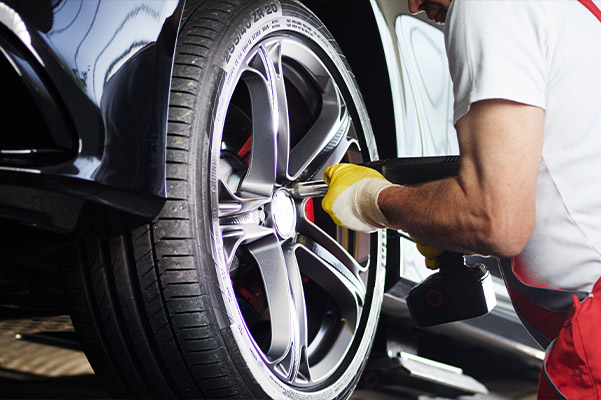The Link In Between Tire Solution and Fuel Effectiveness
Effectiveness in gas usage is a vital concern for vehicle owners seeking to enhance their driving experience. Among the different variables that influence fuel efficiency, tire service stands out as a vital element that often goes overlooked. The elaborate connection in between tire maintenance and fuel economic climate is a testament to the elaborate operations of a vehicle. By understanding how tire treatment directly affects the efficiency of your vehicle, you can unlock a realm of opportunities that not just improve efficiency however also contribute to cost financial savings over time.
Relevance of Appropriate Tire Inflation
Appropriate tire rising cost of living is an essential factor in maximizing fuel efficiency and guaranteeing optimal car efficiency. When tires are underinflated, it creates a lot more rolling resistance, triggering the engine to work harder and burn more gas to maintain the exact same rate. On the various other hand, overinflated tires can bring about a harsher trip, unequal tire wear, and minimized grip. To locate the recommended tire pressure for your car, describe the owner's handbook or the sticker situated on the vehicle driver's side door jamb.
Maintaining the proper tire pressure not just enhances fuel performance however also enhances driving safety and security. Regularly checking and readjusting tire stress, specifically in the past lengthy trips, is a straightforward yet reliable way to enhance your automobile's fuel economic climate and make certain a smooth driving experience.
Influence of Tire Footstep Depth
Maintaining the recommended tire pressure is important for ideal lorry efficiency and gas efficiency; similarly, the walk deepness of your tires plays a crucial role in guaranteeing security and grip on the roadway. Tire tread depth directly influences the ability of your tires to hold the roadway surface area, particularly in damp or unsafe conditions. Frequently evaluating your tire walk depth and replacing tires when needed is a simple yet efficient means to advertise both safety and security and gas performance on the road.
Role of Wheel Alignment in Efficiency
Ensuring accurate wheel placement is essential for maximizing automobile performance and making the most of fuel economic climate. Appropriate wheel positioning involves adjusting the angles of the wheels to supplier specs, guaranteeing that they are alongside each other and vertical to the ground. When wheels are misaligned, it can bring about irregular tire wear, raised moving resistance, and decreased gas effectiveness.

Additionally, accurate wheel alignment can also boost handling and stability, reducing the quantity of power required to maneuver the vehicle (discount tires morris il). By lessening unnecessary friction and drag, correct wheel placement plays a crucial role in boosting total automobile effectiveness and fuel economic situation. Normal wheel positioning checks and adjustments are essential for keeping ideal performance and taking full advantage of fuel financial savings
Link Between Tire Maintenance and MPG
An essential element of optimizing fuel performance in vehicles is the upkeep of tires and their direct effect on miles per check my source gallon (MPG) Correct tire maintenance plays a vital role in optimizing fuel economic situation. On the various other hand, overinflated tires decrease the call spot with the road, leading to irregular wear and reduced gas efficiency.
Additionally, tire tread depth likewise influences gas efficiency. By making certain tires have adequate walk deepness, drivers can improve both safety and fuel economic climate.
Basically, proper tire maintenance, including tracking tire stress and step deepness, is directly linked to accomplishing optimum MPG. By incorporating routine tire inspections and maintenance into a car care routine, vehicle drivers can not just extend tire life but also enhance fuel efficiency, ultimately saving cash and decreasing environmental impact.

Tips for Fuel-Efficient Tire Treatment
Provided the critical partnership between tire upkeep and gas effectiveness, implementing efficient strategies for enhancing tire treatment is key to improving overall car efficiency. To guarantee fuel-efficient tire treatment, normal tire pressure checks are necessary. Properly inflated tires lower rolling resistance, improving gas efficiency and prolonging tire life-span. Furthermore, keeping proper wheel placement and harmonizing helps disperse weight evenly, protecting against unequal tire wear and maximizing fuel consumption. Turning tires at suggested periods advertises also walk wear, boosting gas efficiency by guaranteeing all tires add similarly to lorry efficiency. It is also important to evaluate tires for signs of damages, such as cuts, slits, or bulges, additional hints as these problems can influence fuel efficiency and total safety. Picking tires with low moving resistance can considerably boost fuel economic climate. By including these fuel-efficient tire treatment suggestions right into a routine maintenance timetable, drivers can make the most of fuel performance, decrease running costs, and extend the life of their tires.
Conclusion
By regularly keeping tires and following fuel-efficient tire treatment suggestions, vehicle drivers can enhance their lorry's efficiency and decrease gas usage. It is essential to prioritize tire upkeep to not just conserve cash on fuel costs however likewise to promote overall vehicle effectiveness.